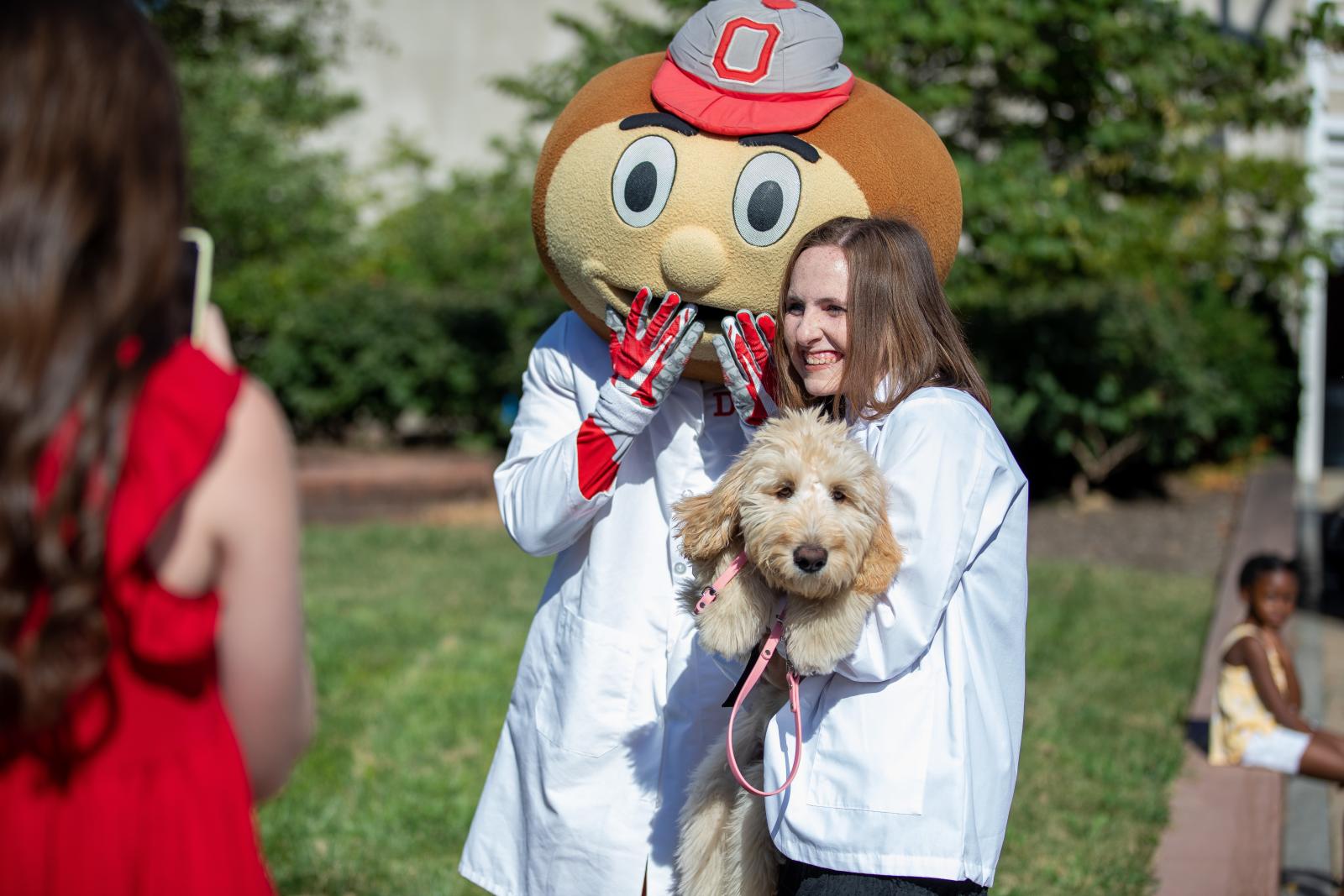At your service: PharmD student expands her impact by training service dogs

Kaylee Clark has limited free time. As a third-year PharmD candidate at The Ohio State University College of Pharmacy, she has to allocate a great deal of her time to classwork, studying and her internship at Ohio State Hospital East.
After the medicine has been delivered and the IVs have been compounded, Clark dedicates what little time she has left to her dogs.
Since 2020, Clark has trained service dogs as a member of 4 Paws for Ability. The Xenia, Ohio-based organization places around 50 dogs per semester with current Ohio State students for training.
Since joining 4 Paws for Ability as a Bachelor of Science in Pharmaceutical Sciences (BSPS) student, Clark has trained six dogs, three of which she cared for from puppy to adulthood. The pups are typically paired with young children and veterans after training is completed.
As someone entering the medical field, Clark noted how training these dogs for medical assistance has changed her perspective on what intervention can look like.
“Whether the dog is going to a veteran or a family with a young child, you’re able to see how that dog can completely change their life,” she said. “You may think that having a dog around is minimal, but it creates a dedicated, immediate response to emergencies. Families have something to help inform safe decision-making with their child, which makes a huge difference.”
Clark has noticed parallels between the interventions that the service dogs provide to their owners and those that she provides in the hospital pharmacy.
“It’s cool to break down my work in the pharmacy the way that I can with the service dogs,” Clark said. “By catching little things like adjusting renal dosage or prescribing a different medication to a patient, there are huge consequences and benefits. Introducing attentive intervention at the right time can leave a major impact on patient treatment”
Though Clark is currently training 4 Paws for Ability trainee Katey, members of the College of Pharmacy are most familiar with Clark’s own dog, Springer.
 Springer began her training as a pup, during Clark’s P1 year, and has become something of an honorary mascot for the college.
Springer began her training as a pup, during Clark’s P1 year, and has become something of an honorary mascot for the college.
The doodle can often be found snoozing through lectures, accompanying Clark to study sessions and even overseeing the annual White Coat Ceremonies.
“Because of her prior service training, Springer could join me practically everywhere,” Clark said. “Having her tag along on family trips and events around the university helped build a solid background of socialization for her.”
Dogs that are trained through the 4 Paws for Ability program can have a variety of service specialties, ranging from mobility assistance to behavioral intervention. Professionals on the 4 Paws for Ability staff assign these based on observed strengths and personalities.
Springer completed her service training, but thanks to her strong service abilities and great social skills, she was recently identified as a candidate for the 4 Paws for Ability breeder program. Clark has taken on the role of Springer’s “guardian home,” which means that Springer stays with her in between her work with 4 Paws.
Though joining the breeder program meant that Springer would no longer work as a service animal, Clark and her classmates didn’t want to see the college lose its favorite furry friend.
“I reached out to the college because I knew that my classmates loved Springer nearly as much as I did,” Clark said. “And luckily, since the college was familiar with her, they allowed me to continue to bring her around.”
The two make quite a pair. With Springer by her side, Clark has been fascinated to see behavioral interventions happen right before her eyes.
“During exam weeks, everyone is clearly stressed at the college,” Clark said. “But as soon as Springer enters the room, you can see people relax when they get to interact with her and let go. It’s really cool to mesh her training as a service dog with her group interactions at the college, even though she’s moved on from her service career.”
While the busy schedule of pharmacy school keeps Clark from training younger pups during the academic year, she’s hopeful to have service dog training play a role in her life during her summers and for years to come.
“Even if I don’t have the time for training puppies while I focus on my PharmD, I’m so lucky to work with the older dogs,” Clark said. “And especially lucky to have my dog with me.”